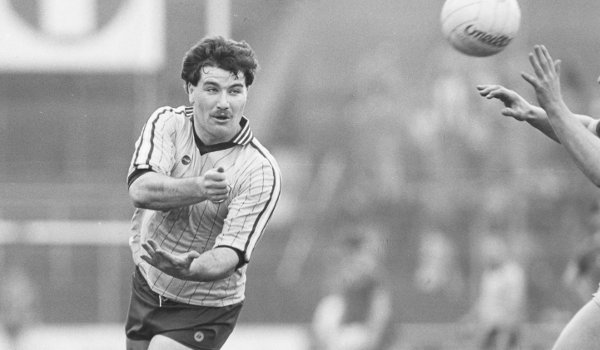I HAVE a memory from my teens of the novelty of watching Offaly playing Wicklow in the Leinster Championship on live TV on a Saturday.
It might seem a humdrum thing to spark excitement but a few years before, when I was a child, even occasions such as the National Football League final were not always deemed worthy of a few hours in the Sunday afternoon schedule.
This weekend, you’ll be able to watch either live or with delayed coverage of all four division games. Celtic Park and St Conleth’s Park will be packed and Dublin and Kerry will draw a crowd to Croke Park double that of some league finals of yesteryear.
If you take the time to make a sober comparison of how the game was and how the game is — even within the lifetime of a short-toothed columnist — you will realise that the league is a competition revolutionised.
That is the problem with those bores who will spend the next three months telling you that you’re watching an irrelevance. They have not adjusted their clock from the 1980s and 1990s to 2014.
They are repeating an adage from a time when overweight men played almost half their league games pre-Christmas.
But this is a time when the game is serious enough that, in the top counties, how players fare as spring gathers pace can have as much of an effect on their season as how they perform during a routine hammering of a lesser team in the first couple of rounds of provincial action.
Bernard Brogan’s experience in 2013 underlines the point. He started the league campaign as if he was set fair to repeat his wondrous form of 2010.
But injury led to a handful of missed league games, to an inability to develop any kind of sharpness and rhythm to the point where he never played near his capabilities until the All-Ireland final. That is not our spin; that is a paraphrasing of the man himself’s assessment in a recent interview.
 Joe McNally. Players' conditioning and attitude towards the League differs hugely from their respective eras
Joe McNally. Players' conditioning and attitude towards the League differs hugely from their respective erasThe league, though of course still very much a secondary affair, is now a competition of increased attendances and coverage where the results matter and the competition for places and form matters even more.
For every Jim McGuinness turning his nose at the exercise, there are four or five Jim Gavins treating it with deadly seriousness.
The facts and figures linking good league performance to good championship performance are so compelling that there is no need to rehash them anymore and those who take a contrary view and pick out examples such as Donegal 2012 should realise that how hard they have to search for such straws proves they are wrong.
They also ignore that even Donegal’s surge to the top table started with a stellar league campaign in 2011. Besides, is it really that much of an indictment that sometimes the winners of competitions that take place months apart are different?
To argue that it is would be a bit like proclaiming the Australian Open an irrelevance if Stan Wawrinka does not win Wimbledon this summer.
Plenty of teams would have much to gain from raising silverware just before the main event.
For Dublin, it would proclaim the absence of a hangover, and prove their oft-trumpeted strength in depth, given that their long absentee list includes Brogan, Paul Flynn, Diarmuid Connolly and Ger Brennan.
For Mayo, it would suggest that back-to-back All-Ireland failures has deepened rather than dulled their hunger.
For Kerry, it would lend weight to Eamonn Fitzmaurice’s assertion that they are a long way ahead of where they were this time last year in terms of fitness and focus.
For Cork, it would attach great optimism to the Cuthbert era, and for Tyrone, it would reinforce their image as a coming team.
Avoiding relegation would do nicely for Kildare, who need unity after the off-season blood-letting, and Derry, who need to prove they can thrive in the absence of the brilliant Eoin Bradley.
In the other divisions, the questions are also enticing: wouldn’t Galway, for example, benefit greatly from sitting atop of a cut-throat division two, thereby adding substance to the signs of revival in their close-run qualifier game with Cork?
The first chance to divine whether they will do so is what makes games such as their trip to Navan on Sunday so inviting.
All four divisions are well-matched enough — much more so than three of the four provincial championships — that it is much easier to ask interesting questions than to offer definitive answers.
Nonetheless we will tentatively suggest that in division four, Antrim look the part, while Cavan in the next league up look the heaviest favourites of all; it will surely not have escaped their attention that Monaghan’s Ulster triumph last year was preceded by success in this division.
Division Two is anybody’s, though we do feel Galway’s weight of talent has to tell someday soon, and Armagh, Monaghan and Down should set their sights high, given their favourable fixture lists.
In the big one, Tyrone are good enough to grind out plenty of wins from a merciless schedule, but trips to Kerry and Cork might undo them. Mayo ought to offer a stern challenge; we will be able to gauge their mood better if they win in Newbridge on Sunday, as they should.
But Dublin, with four home games, look the best bet to survive their injury list and rehearse what repeat success feels like before the curtain is raised on the biggest show of all.

